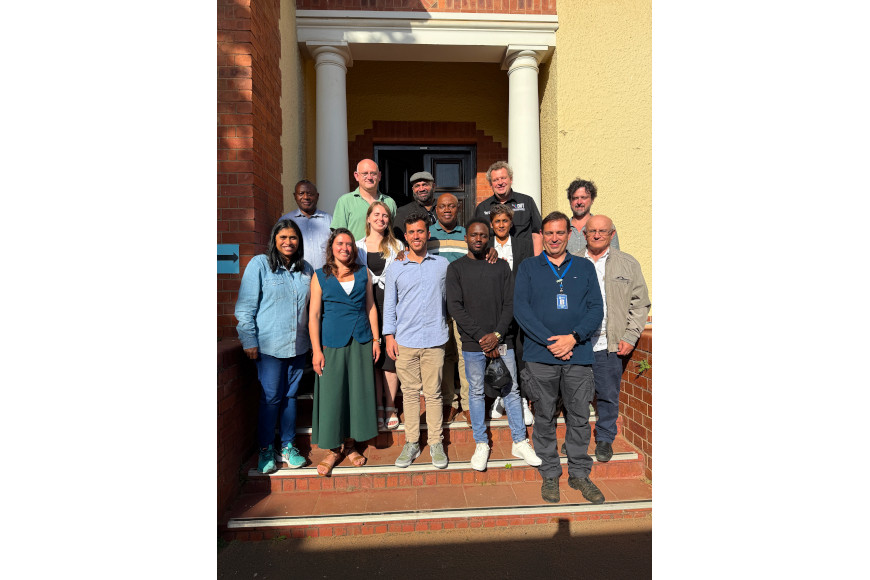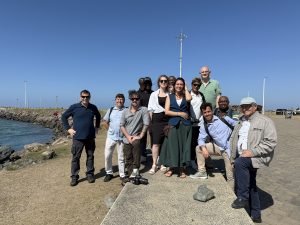The Durban University of Technology (DUT) International Week 2025 which recently took place, brought together local and international experts, fostering dialogue on critical issues in higher education internationalisation, with a particular focus on developing intercultural competence, expanding access to international perspectives, and promoting more equitable global partnerships. Following the success of the DUT International Week 2025, the International Education and Partnerships office and the Department of Public Management and Economics at DUT jointly played host to a delegation from Brazil and Russia, at Ritson campus last Friday, 22 August 2025.
The visit formed part of an ongoing project, headed by DUT’s Dr Mal Reddy, Associate Director Department of Public Management and Economic. She indicated that as part of the joint collaborative NRF BRICS research-funded project titled: “Assessment of Vulnerability of Coastal Ecosystems to Climate Change for the Purpose of Adapting Governance and Nature Management,” the South African team, comprising of representatives from DUT and the Mangosuthu University of Technology (MUT), hosted the international delegation of esteemed visiting professors from the Federal University of Rio de Janeiro (UFRJ), Brazil, and the A.O. Kovalevsky Institute of Biology of the Southern Seas, Russia.
The group visited various sites along Durban’s Golden Mile, as an extension to the project, currently focussed on South Africa’s west coast. The delegation from the Federal University of Rio de Janeiro (UFRJ), Brazil included Professor Fábio Luiz Peres Krykhtine, Professor Osvaldo Moura Resende and Mr Francis Martins Miranda. Representing the A.O. Kovalevsky Institute of Biology of the Southern Seas, Russia was Professor/Dr Tatiana Gorbunova, Professor/Dr Roman Gorbunov and Ms Mariia Safonova.
The South African team comprises representation from DUT, MUT, and various municipal stakeholders. Participating in the the South African delegation are Dr Mal Reddy, Professor Oludolapo Olanrewaju, Dr Ajayi Oluyomi, Professor Mora-Camino Felix, Professor Paul Musonge and Mr Philip Aondona. Dr Sean Odonoghue, from eThekwini Climate Adaptation, provided expert insight into the challenges and successes in the city’s efforts to address social issues.
The site visit was followed by the much-anticipated DUT Welcome meeting with the BRICs delegates at the Ritson campus.
DUT’s Dr Lavern Samuels: Director: International Education and Partnerships welcomed the BRICs delegation saying that BRICS is vitally important in all that the university does.
“We need to consolidate the way we work together politically in terms of business, economics, but also our scientific endeavours,” he said.
The BRICs delegates were given a video snapshot on the city of Durban, explaining more on the history of the city of Durban.“Durban is the busiest port in in Africa, and the biggest, 80% of the industrial output of South Africa goes through the port of Durban. So it’s very important. It has a population now of 4.2 million because it’s such a rapidly growing city,” shared Dr Samuels. He also spoke on DUT having a distinctive education. “One of the areas we work on in internationalisation is called Collaborative Online International Learning (COIL). We have 200 of these global classrooms together. We work closely with Brazil and call it the Brave Project and these classrooms for six weeks bring students together, bring professors together where they can teach and assess together,” he shared.
Dr Samuels indicated some of the areas such as research, internationalisation, and internationalisation of the curriculum are what local and international delegates can consider working on together.
Adding to the discussion, Dr Reddy stressed that the success of such deliberations lies in a genuine commitment to advancing DUT as an engaged university and in fostering the development of adaptive graduates through outcome-oriented, collaborative efforts. She highlighted that this commitment is reflected in the multidisciplinary expertise of the team: comprising academia, industry, government, and postgraduate students; working in partnership towards a shared global agenda on climate action.
“I strongly encourage us to foster meaningful connections beyond these engagement sessions. The current project being pursued by the BRICS Team is of critical importance, particularly in addressing the impact of climate change on coastal regions. We’ve witnessed its effects first-hand in Durban: the recent unprecedented rainfall events that signal the urgent need for action. We cannot rely solely on major decision-makers to drive change, especially when many countries are still not taking climate change seriously. The responsibility lies with all of us,” she remarked.
The conversation then followed among all delegates, with a general consensus emerging that academic researchers must work closely with practitioners to ensure that the solutions, recommendations, and strategies developed through these initiatives are both practical and contextually relevant at the local and community level. Overall, delegates expressed great optimism about the potential for significant innovation and technology-driven approaches, including preliminary discussions around the possible establishment of an innovation hub.
Pictured: The DUT delegation team with the international delegation of esteemed visiting professors from the Federal University of Rio de Janeiro (UFRJ), Brazil, and the A.O. Kovalevsky Institute of Biology of the Southern Seas, Russia.
Waheeda Peters


